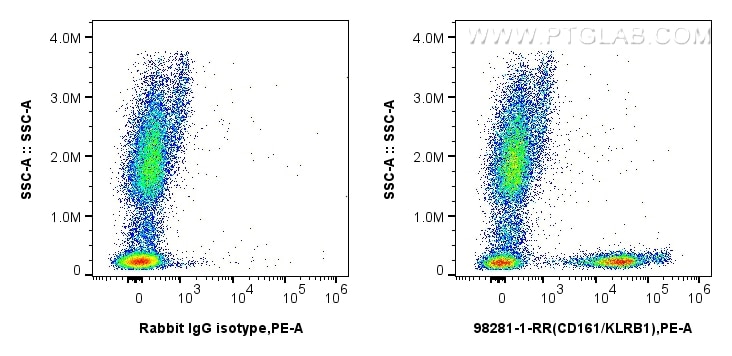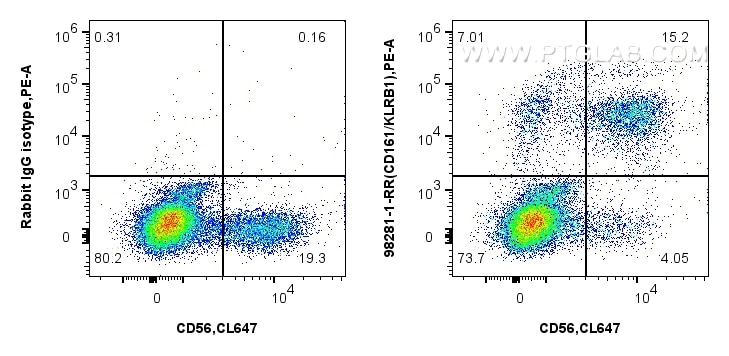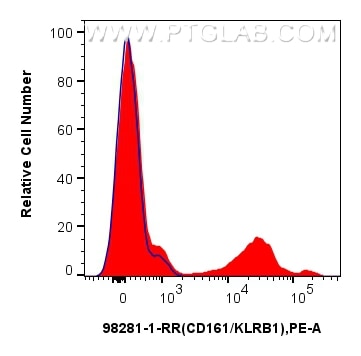KLRB1/CD161 Rekombinanter Antikörper
KLRB1/CD161 Rekombinant Antikörper für FC
Wirt / Isotyp
Kaninchen / IgG
Getestete Reaktivität
human
Anwendung
FC
Konjugation
Unkonjugiert
CloneNo.
242140H5
Kat-Nr. : 98281-1-RR
Synonyme
Geprüfte Anwendungen
| Erfolgreiche Detektion in FC | human peripheral blood leukocytes |
Empfohlene Verdünnung
| Anwendung | Verdünnung |
|---|---|
| This reagent has been tested for flow cytometric analysis. It is recommended that this reagent should be titrated in each testing system to obtain optimal results. | |
| Sample-dependent, check data in validation data gallery | |
Produktinformation
98281-1-RR bindet in FC KLRB1/CD161 und zeigt Reaktivität mit human
| Getestete Reaktivität | human |
| Wirt / Isotyp | Kaninchen / IgG |
| Klonalität | Rekombinant |
| Typ | Antikörper |
| Immunogen | Rekombinantes Protein |
| Vollständiger Name | killer cell lectin-like receptor subfamily B, member 1 |
| Berechnetes Molekulargewicht | 25 kDa |
| GenBank-Zugangsnummer | NM_002258.3 |
| Gene symbol | CD161 |
| Gene ID (NCBI) | 3820 |
| Konjugation | Unkonjugiert |
| Form | Liquid |
| Reinigungsmethode | Protein A purfication |
| Lagerungspuffer | PBS with 0.09% sodium azide |
| Lagerungsbedingungen | Store at 2 - 8°C. Stable for one year after shipment. |
Hintergrundinformationen
CD161, also known as KLRB1 or NKR-P1A, is a type II transmembrane C-type lectin-like receptor and is expressed on the cell membrane as disulfide-linked homodimer (PMID: 8077657). It is expressed by the majority of NK cells and subsets of peripheral T cells, including both CD4+ and CD8+ T cells, and is expressed preferentially on adult T cells with a "memory" antigenic phenotype (PMID: 8077657; 22566826). Expression of CD161 correlates with the cytotoxic function of CD16+ NK cells, and ligation of CD161 with its ligand LLT1 inhibits NK cell cytotoxicity and cytokine secretion (PMID: 29686665).
Protokolle
| PRODUKTSPEZIFISCHE PROTOKOLLE | |
|---|---|
| FC protocol for KLRB1/CD161 antibody 98281-1-RR | Download protocol |
| STANDARD-PROTOKOLLE | |
|---|---|
| Klicken Sie hier, um unsere Standardprotokolle anzuzeigen |




